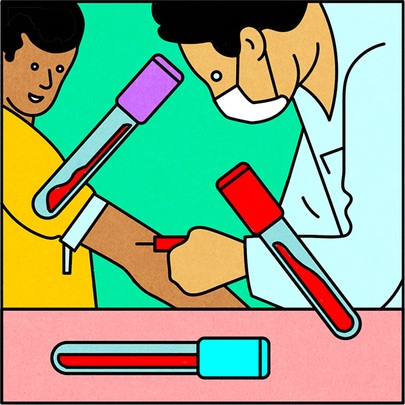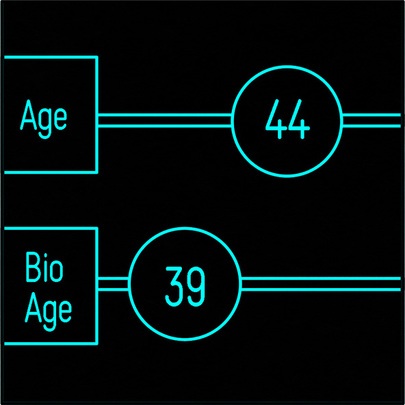Measure
Utilizing advanced biological research and machine learning, BioAge™ is testing combinations of almost 50 biomarkers. Among these, the 9 specific markers show the highest probability of predicting lifespan and health risks.
Understand
BioAge™ provides insight into your biological aging and an indication of health risks and the risk of premature death by measuring markers that reflect the status of: brain, heart, metabolism, immune system, inflammation, kidney, liver, hormones, and blood.
Improve
Based on the results, we follow up with evidence-based recommendations and protocols to optimize both the length and quality of your life. You can also speak directly with our doctors through consultation.
How does it work?
1. Order BioAge™
- Add BioAge™ to your cart. We will create a referral containing all your tests for test sites and laboratories after payment.
- Confirmation and receipt are sent via email.
- An email is sent out to activate your account if you do not already have one with us. This is required for us to be able to present test results securely behind BankID.
2. Find a Test Site
- We have a number of sites with drop-in services across Sweden.
- Find you nearest site and their opening hours here.
3. Test Results and Follow-Up
- The test results will be displayed in your journal within 1-5 working days and is reviewed by a licensed doctor.
Good to know before taking the test
Important to consider before the blood test:
- Take the test on an empty stomach - you should not eat nor drink anything for 10 hours before the test. (Exceptions are water and black coffee/tea without sugar or milk.)
- The test should be done in the morning before 10 am because some biomarkers are sensitive to the circadian rhythm.
- Preferably rest for 15 minutes in the waiting room before the sampling for more accurate results.
- Do not take any medications before the blood test.
- Bring valid identification.
Where can I find locations for taking the test?
You can simply ask the chatbot, otherwise click here.
-
 Laboratory Medical Analysis
Laboratory Medical Analysis
-
 Accredited by SWEDAC
Accredited by SWEDAC
-
 SS-EN ISO 15189
SS-EN ISO 15189
How accurate is BioAge™?
When biological age was tested independently, researchers could predict with 90% accuracy who had the highest likelihood of surviving in the next 10 years. Without knowing more about the person, this type of test can not only estimate biological age but also reveal changes in individual biomarkers associated with the most common age-related diseases.
What is unique with BioAge™?
- BioAge™ is based on one of the most accurate epigenetic clocks known to scientists at this point in time.
- BioAge™ has a high likelihood of predicting the risk for mortality and other age related diseases.
- BioAge™ makes proactive personal recommendations possible.
- BioAge™ is easy to take irregardless of age and health profile.
- BioAge™ is less costly than tests with similar reliability.
What is the difference between biological age and chronological age?
Chronological age, the more familiar concept, represents the passage of time as we celebrate each birthday, advancing by one year. In contrast, biological age signifies the extent of age-related changes that occur within the body. It assesses the degree of aging based on physiological factors, reflecting how well or poorly the body has aged.
Why is it important to know your biological age?
Understanding one's biological age is significant as it allows for a comparison with one's chronological age. This comparison offers valuable insights into whether the body is aging at an accelerated pace or maintaining a more youthful state. Identifying this difference at an early stage provides an opportunity to take preventive measures against age-related decline.
What should I do if my biological age is higher than my chronological age?
If your biological age is higher than your chronological age, it could indicate that your body is aging faster than it should be for your age.
We have gathered a few actions you can take to improve your biological age:
-
Get a comprehensive health assessment
-
By assessing your overall health, you can get a better understanding of your health status, setting a roadmap for improvements and identify potential underlying health conditions. One way to start your journey is by taking our CheckUp™.
-
Exercise regularly
-
Exercise is probably the most effective medicine on planet earth! Through exercise, you help maintain a healthy weight, you can reduce stress, you can improve your cardiovascular health and you can improve your sleep.
-
Eat a healthy diet
-
A healthy diet that includes plenty of vegetables, fruits, whole grains, lean proteins and healthy fats can help slow down your aging process by improving your overall health.
-
Reduce stress
-
Chronic stress has the ability to accelerate the aging process. By reducing your everyday stress through techniques such as relaxation exercises, yoga or meditation you may slow down your aging.
-
Get enough sleep
-
Your body will not function properly, nor be able to repair and regenerate without sufficient amount of sleep. Aim at 7-9 hours of good sleep per night.
-
Avoid unhealthy habits
-
Avoid harmful habits such as smoking and excessive alcohol consumption.
Clinical tests and studies
Levine ME, Lu AT, Quach A, Chen BH, Assimes TL, Bandinelli S, Hou L, Baccarelli AA, Stewart JD, Li Y, Whitsel EA, Wilson JG, Reiner AP, Aviv A, Lohman K, Liu Y, Ferrucci L, Horvath S. An epigenetic biomarker of aging for lifespan and healthspan. Aging (Albany NY). 2018 Apr 18;10(4):573-591. doi: 10.18632/aging.101414. PMID: 29676998; PMCID: PMC5940111.
https://www.ncbi.nlm.nih.gov/pmc/articles/PMC5940111/
Higgins-Chen, A.T., Thrush, K.L., Wang, Y. et al. A computational solution for bolstering reliability of epigenetic clocks: implications for clinical trials and longitudinal tracking. Nat Aging 2, 644–661 (2022). https://doi.org/10.1038/s43587-022-00248-2
https://www.nature.com/articles/s43587-022-00248-2#citeas
Summary with one of the authors - our advisor associate Professor Sara Hägg https://news.ki.se/improved-reliability-of-epigenetic-clocks
Morgan E Levine, Assessment of Epigenetic Clocks as Biomarkers of Aging in Basic and Population Research, The Journals of Gerontology: Series A, Volume 75, Issue 3, March 2020, Pages 463–465, https://doi.org/10.1093/gerona/glaa021
https://academic.oup.com/biomedgerontology/article/75/3/463/5717592




